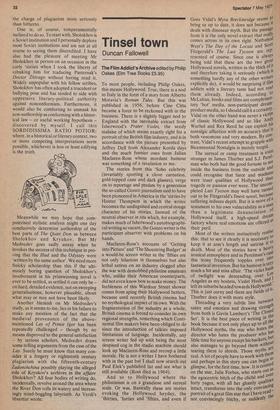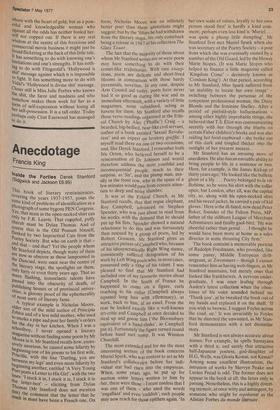Tinsel town
Duncan Fallowell
The Film Addict's Archive edited by Philip Oakes (Elm Tree Books £5.95) To most people, including Philip Oakes, this means Hollywood. True, there is a nod to Italy in the form of a story from Alberto Moravia's Roman Tales. But this was published in 1956, before Cine Citta became a force to be reckoned with in the business. There is a slightly bigger nod to England with the inevitable extract from Isherwood's Prater Violet, the seedy malaise of which seems exactly right for a portrait of the British film industry, and is in accordance with the picture presented by Jeffrey Dell from Alexander Korda days and the much funnier ones from Julian Maclaren-Ross whose mordant humour was something of a revelation to me.
The stories from this 'Soho celebrity (invariably sporting a clove carnation, gold-topped cane and dark glasses), verge on to reportage and predate by a generation the so-called Gonzo journalism said to have been pioneered in America in the 'sixties by Hunter Thompson in which the writer becomes the undisguised and central stooge character of his stories. Instead of the neutral observer in situ which, for example, makes much of Isherwood's autobiographical writing so vacant, the Gonzo writer is the participant observer with problems on his hands.
Maclaren-Ross's accounts of 'Getting into Picture' and 'The Shoestring Budget' as a would-be screen writer in the 'fifties are not only hilarious in themselves but also lethal satires on an industry clogged after the war with demobbed philistine amateurs who, unlike their American counterparts, did not even know how to make money. The feebleness of this Wardour Street shower comes from aping their Hollywood betters, because until recently British cinema had no mythological impact of its own. With the fragmentation of the industry as a whole, British cinema is forced to consider its own regional strengths, something which Continental film makers have been obliged to do since the introduction of talkies imposed limitations of language. Incidentally, any screen writer fed up with being the most despised cog in the studio machine should look up Maclaren-Ross and recoup a little morale. He is not a writer I have bothered with in the past but I shall now search out Paul Elek's published list and see what is still available (Ross died in 1964).
And so to Hollywood where the philistinism is on a grandiose and surreal scale. Or was. Basically these are stories evoking the Hollywood heyday, the 'thirties, 'forties and 'fifties, and even if
Gore Vidal's Myra Breckinridge seems to bring us up to date, it does not because it deals with dinosaur myth. But the passage from it is'the only novel extract that reallY comes across in its own right. Nathan West's The Day of the Locust and Scott Fitzgerald's The Last Tycoon are rer resented of course. Since one is always being told that these are the two great Hollywood novels, written in the thick of it and therefore taking it seriously (which is something hardly any of the other writers explicitly do), it would be surprising if filln addicts with a literary taste had not read them already. Indeed, according t° McLuhan, books and films are complemea. tary 'hot' media, non-participant dream' product media, so I should call it a certaintY' Vidal on the other hand was never a victim of classic HollYwood and so like AndY Warhol and Rex Reed he can exploit his nostalgic affection with an accuracy that j5 both venomous and very modern. BY cntl. trast, Vidal's recent attempt to grapple with Bicentennial Nostalgia is merely turgid. The surreal or camp treatment is even stronger in James Thurber and Si. Perel' man who both had the good fortune to see inside the business from the outside and could recognise that farce and madness were truer qualities of Hollywood than tragedy or passion ever were. The tinennl; pleted Last Tycoon may well have turneu out to be Fitzgerald's finest novel, because suffering induces depth. But it is more of a testament to his own vulnerability as a 11180, than a legitimate denunciation 0' Hollywood itself, a high-speed dream factory where real emotions are offered at their peril. Most of the writers instinctively realise this: that to see it clearly it is necessarY t° keep it at arm's length and satirise it to death. Most of the stories have a lleavY ironical atmosphere and in Perelman' ease this irony frequently topples over int° fantastical invention. But his humour is very much a hit and miss affair. 'The violet hat of twilight was descending over lei Angeles as my hostess, Violet Hush, an°, left its suburbs headed towards Hollywo°`!: This is just corny and there are fields of Thurber does it with more style. Threading a very subtle line betWeea, satire and emotion and drawing strengt1", from both is Gavin Lambert's 'The Close,' Set'. It is the best piece of writing in t,he book because it not only plays up to all tHe Hollywood myths, the star who hates the director who hates the producer who little time for anyone except his backers,hu; also manages to go beyond them with°. tearing them to shreds. Those myths at' real. A lot of people have to work with the and perhaps in this story one can begin tv, glimpse, for thefirst time, how. It is centrvs on the star, Julie Forbes, who starts out a_ the egocentric bitch of the cliche and avers forty pages, with all her ghastly qualit,ie, intact, transforms into the only convincint' portrait of a great film star that I have read—
be
Whore with the heart of gold, but as a powerful and knowledgeable woman who against all the odds has neither fooled herself nor copped out. If there is any real Wisdom at the centre of this ferocious and commercial movie business it might just be found flickering at the back of this little tale. It has something to do with knowing one's hmitations and one's strengths. It has nothing to do with Fitzgerald's 'Hollywood is Shit' message against which it is impossible to. fight. It has something more to do with Vidars 'Hollywood is divine shit' message. Closer still is Miss Julie Forbes who knows the shit, the farce and madness and who somehow makes them work for her as a form of self-expression without losing all her self-possession. It is a tall order. Today Perhaps only Clint Eastwood has managed to do it.







































 Previous page
Previous page